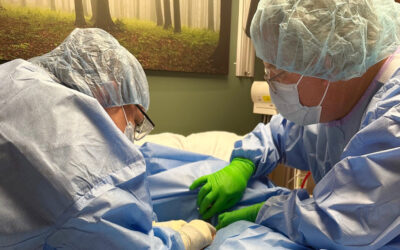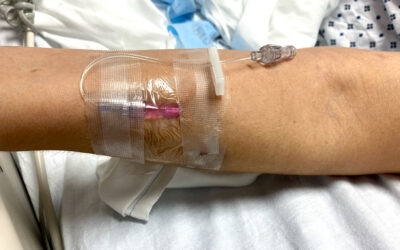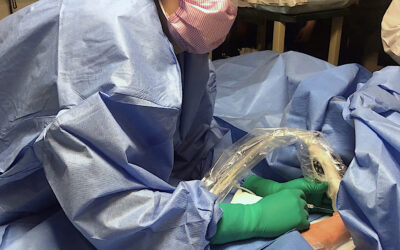Hospital at Home Difficult Sticks highlights a Hospital at Home patient who needed vascular access for labs, but their depleted veins made obtaining vascular access difficult, and resulted in repeated and painful attempts that were unfortunately unsuccessful.
The Hospital at Home program is one of the newest care concepts and enables eligible patients to receive inpatient acute-level care in their home rather than in the hospital. This model, for qualified patients, has been shown to improve patient outcomes, reduce costs, speed recovery, and improve patient’s overall experience.
Hospital at Home Difficult Sticks
– Vascular Access Component
Vascular access is a critical component in the delivery of the best and most comprehensive acute care, and this is no different for Hospital at Home patients who often require IV access for a variety of therapies, including medication delivery and blood sampling for lab testing. Whether the patients are at home or in the hospital, many have veins that are difficult to access due to comorbidities and pre-existing conditions. This Nurse Clinician in Action case illustrates how partnering with Vascular Wellness enables healthcare systems to be successful with new program initiatives, and how these programs, if implemented well, can dramatically improve a patient’s experience and outcome.
Hospital at Home Difficult Sticks
– Clinical Case
The patient presented to the Emergency Department at a hospital and was diagnosed with several comorbidities, including sepsis and thrombocytopenia, a condition that occurs when the platelet count in a patient’s blood is too low. Consultation within the care team confirmed that this patient was a candidate for their Hospital at Home program, and the patient was able to return home to continue her treatment plan.
After several days of in-home treatment, labs were ordered to confirm the patient’s healing progress. The medical provider arrived at the patient’s home and made multiple attempts to gain vascular access but was unsuccessful. Unfortunately, the patient’s veins were depleted, so she had endured more than 10 unsuccessful attempts, which resulted in numerous and unnecessary painful needle sticks. Vascular Wellness was consulted to assist.
Hospital at Home Difficult Sticks
– Diagnosis and Treatment
The Vascular Wellness clinician arrived at the patient’s home and checked in onsite via the remote virtual terminal. After assessing the patient’s vasculature, the clinician then quickly and effortlessly achieved vascular access on the first attempt utilizing ultrasound guidance. The patient was thrilled and stated, “I didn’t even feel it, I was expecting to be poked a lot more that that!” She also told the Vascular Wellness nurse clinician that she had made her day. Anybody who has been repeatedly poked with needles can understand this patient’s sense of relief knowing no more painful sticks were needed. The care team was appreciative that the needed blood samples could now be tested for patient monitoring.
Vascular Access Experts
– Key Points
Enable Faster Patient Therapy: As hospitals embrace the need and demand for Hospital at Home programs and participation, it creates an incremental challenge to cover these additional patients who are now spread out across the community. When nurses are deployed to perform a needed vascular access procedure on a patient in a Hospital at Home program, the expectation is that the nurse clinician can successfully complete the order in a timely fashion so that there are no complications or delays in care and treatment. A delay at one patient’s home can cause a large ripple effect that we refer to as a Delay Cascade. Not only does this cause a delay in the timely treatment – and any follow-on treatments – but it also impacts the subsequent patients who still need to be seen after this visit. In the case of this patient, the inability of the primary provider to complete the bloodwork for labs in a timely manner resulted in a costly delay in care, and a stressful and painful experience for the patient.
Extensive Geographic Coverage: Partnering with and relying on Vascular Wellness for vascular access needs is the smart, safe, and economical choice for Hospital at Home programs. We serve as a valued extension to your patient care teams, and we encourage our partners to call on us right away as soon as any difficulty in gaining vascular access is identified via medical record or history review or on-site. Vascular access is the foundation to many treatment plans, and our established infrastructure and extensive geographic coverage model via mobile and highly trained Vascular Access Experts can help Hospital at Home programs thrive and deliver a superior patient experience.
Enrich Patient & Family Experience: Vascular Wellness nurse clinicians are Vascular Access Board Certified (VA-BC) and perform successful standard and advanced vascular access procedures at the bedside every day. These highly skilled Vascular Access Experts bring all of their own supplies and equipment – the facilities need only have the patient in bed (at facility or at home) and ready for the procedure. In the case of this patient, the Vascular Wellness clinician arrived quickly and completed the procedure on the first attempt. Additionally, Vascular Wellness clients only pay for ordered procedures, as there is no cost to partner with us and simply have us at the ready when needed.
Experienced At Home Provider: Vascular Wellness regularly performs both standard and advanced vascular access procedures in many community, rural, and satellite hospitals in addition to larger, acute care facilities. These ultrasound-guided procedures include everything from inserting difficult-to-place Peripheral IVs (PIVs), Midlines, PICCs, and Internal Jugular, Mid-thigh Femoral, and Axillary Central Lines, to placement of Tunneled Central Lines and Large Bore Dialysis Catheters – all of which are placed at the patient’s bedside. This makes for an easy transition to choose Vascular Wellness as the primary and preferred vascular access provider in Hospital at Home programs.
Nurse Clinicians in Action is a spotlight series highlighting some of the interesting cases that Vascular Wellness clinicians have encountered and participated in treatment. These cases involve challenging situations or intriguing clinical presentations and may involve more than one Vascular Wellness clinician, as our clinicians have the ability to consult each other while in the field, as well as an on-call Clinical Administrator via a HIPAA (Health Insurance Portability and Accountability) compliant communication app. In addition, our extensive training program and diverse client base, including Level 1 Trauma Centers, Short Term Acute Care Hospitals, Long Term Acute Care Hospitals, and Skilled Nursing Facilities, provide our clinicians with a wide array of clinical experience and why we believe our clinicians, as a group, are the most experienced and best trained and supported vascular access clinicians.
If you require Vascular Access or want to learn more, speak to the team at Vascular Wellness today. For the latest articles and insights, follow us on LinkedIn, Facebook, Twitter, YouTube, and Instagram.
Vascular Wellness provides:
(1) Comprehensive vascular access services to North Carolina, South Carolina, and Virginia; and
(2) Customized vascular access services to Tennessee, Georgia, and West Virginia; and
(3) Support vascular access services to Pennsylvania, Ohio, and Kentucky.
Read more NCIA Patient Cases
Nurse Clinicians in Action stories highlight some of the interesting cases in which Vascular Wellness clinicians have encountered and participated as valuable team members.
Need a Vascular Access Expert?
Vascular Wellness is one of very few Vascular Access nursing companies providing Tunneled Central Line Placement Services.






